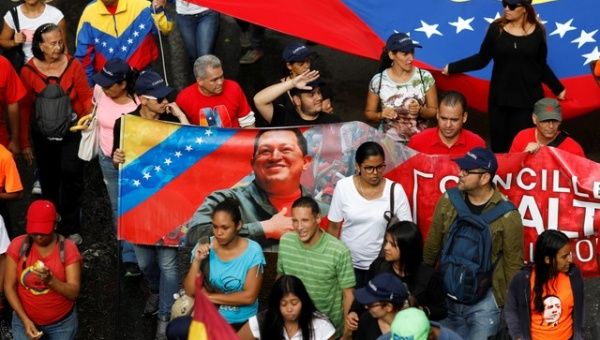Nobody relying on the news media in Ireland can have any understanding of events in Venezuela. They take their line from the international corporate media (primarily North American, British and Spanish) which is waging a media war against the government. According to them, Venezuela’s economy is collapsing due to the socialist policies of the dictator Nicolas Maduro, and the opposition forces which they support are democratic. They tell you the press is suppressed, although anyone can see that it is overwhelmingly right-wing and anti-government. They never report on the economic war being waged by the big retail monopoly, Empresas Polar, and other businesses – creating shortages, hoarding goods, driving up prices, or the effects of the sanctions imposed by the United States and its allies, including the European Union.
These measures have indeed had a crippling effect on the Venezuelan economy, admittedly compounded by the mistakes of the government, and are inflicting great hardship on the population. Strangely, the poor, who suffer the most from the crisis, continue to support the Bolivarian process, while the rebels who blocked the roads with burning tyres, besieged a maternity hospital, destroyed food supplies, and created violence and mayhem on the streets all come from well-off families (See Abby Martin’s reports).
The attacks on Venezuela are part of a general counter-offensive against the popular movements in Latin America, which has achieved some success in Brazil, Argentina and Ecuador and elsewhere, where US hegemony has been re-established with the help of the oligarchies in those countries. When the US declares new sanctions against Venezuela, a number of client states can be relied on to follow suit, as does the European Union. The US, Brazil and Colombia have been holding military exercises on Venezuela’s borders. The Venezuelan opposition has been an enthusiastic supporter of sanctions, touring the world soliciting new measures. They have not fared so well with their own programme in Venezuela, in spite of winning the election to the National Assembly. Most of them campaigned for a boycott of the Presidential election last May, the one who broke ranks, Henry Falcon, was heavily defeated by Maduro. The election was condemned by Trump, who announced new sanctions as a punishment. But nothing has worked out for the opposition; the street violence organised by the extreme right antagonised even their own supporters, even their 2002 coup only lasted 48 hours. Participating in elections, boycotting elections, could not dislodge Chavez, cannot remove Maduro. Desperation is setting in – so last month there was an attempt to assassinate the president. Two drones loaded with high explosives approached the platform where he was speaking. Had they hit their target they would have caused many casualties. Fortunately one crashed and the other was shot down.
According to the corporate media, this never happened at all – it was organised by Maduro himself to justify repression of the entirely blameless opposition. There was, however a statement from an organisation calling itself “Soldiers in T-shirts”, claiming responsibility for the attempt, which was read out on a Miami television station by the well-known journalist Patricia Poleo. Another Miami journalist claims to have known about it in advance. Some of those who have been arrested have implicated right-wing politicians, notably Julio Borges, a veteran of the 2002 coup d’état, and Juan Requesens, who has advocated an invasion of Venezuela. Borges is in Bogotá, Colombia, Requesens has been arrested.
The attempt on Nicolas Maduro’s life is indeed another failure for the right, illustrating once again their incompetence and disunity. Inevitably, Chavistas will rally round their president, but, as Paul Dobson argues on Venezuela Analysis (venezuelanalysis.com) this could inhibit the important debate within Chavismo about how to defend their gains and move forward. There has been considerable disaffection with some of the government policies, particularly among the communal co-operative enterprises in the countryside. They organised a 400 km march to Caracas where they met with the president, urging a more assertive development of the communes, quoting Hugo Chavez “The Communes or nothing” as the way forward. Indeed, Maduro has achieved nothing by appeasement, by trying to negotiate with the opposition or with the business organisation. Neither they nor their imperial masters are in any mood to concede anything. The strength of Chavismo has been the level of public participation in policymaking – this, as Paul Dobson would argue, needs to be maintained and strengthened in order to defend the popular gains and advance further.






